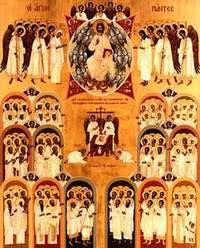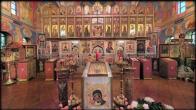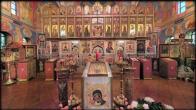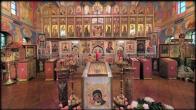You are here
Homily on Sunday of all saints, who have shone forth in the land of Russia

Holy Hierarch St John (Maximovitch)
The Day commemorating the saints who have shown forth in the Russian land points to that spiritual heaven beneath which the Russian land was founded and lived.
Before the holy Prince Vladimir, there lived on the Russian land separate, pagan tribes that warred with one another. The holy Prince Vladimir brought them a new faith, a new consciousness and meaning of life, a new inner spiritual state; he gave them a new spirit of life that united everyone, and thus a single nation was formed.
The very existence of the Russian nation is tied to the begetting of spiritual life within it, with the assimilation of the fundamentals of a Christian world-view. It is senseless to seek the meaning and purpose of life in earthly life, which ends with death. One must strive to acquire the Divine, grace-filled, eternal life, and then this temporal, earthly life will arrange itself as well: Seek ye first the Kingdom of God and his righteousness; and all these things shall be added unto you (Matt. 6:33).
Faith and the Orthodox Church united the separate tribes into one nation. Faith in the Kingdom of God and the search for it, the search for righteousness [pravda] became the most salient characteristic of the Russian people.
For the sake of the Kingdom of God, for the sake of participation in it, for the sake of prayer, Russian ascetics left the vanity of the world and went into the forests, onto uninhabited islands. They sought only the Kingdom of God. They did not want to found or build anything; they went away from people, but people followed after them for the sake of the Kingdom of God, which was present on those islands and in those forests around the righteous ones, and thus lavrasand monasteries grew up.
The search for righteousness is a basic thread in the life of the Russian people, and it is not by chance that the first written code of laws, which was designed to regulate life, was called “Russian Justice” [Russkaya Pravda ].
It was not only those who withdrew from the world and from the company of men, who thought about heaven and the Kingdom of God; all believing Russian people understood the meaning of life. All who truly contributed to the development of Russia as a nation, likewise considered that their primary concern was to be faithful to the Divine Kingdom and to Divine Truth [Pravda].
In Russia there were princes, military leaders, landowners, people of all ranks and occupations; and all had in common a fundamental understanding and striving, which were the acquisition of the Kingdom of God and participation in it. This was the meaning of life.
Saint Alexander Nevsky spent his entire life in struggles on behalf of the military and the State; he rode on horseback through the whole of Siberia to the Tartar khan in order to establish peace in Russia, and became renowned for his military victories. But when he fell ill and death came, he accepted it as liberation from the labors of earthly life and gave himself over to that which was dearer than everything to his soul and became a monk, in order to enter the longed-for Kingdom of God, not as an earthly warrior, but as a warrior of Christ.
Prince Theodore of Smolensk likewise accepted monasticism before his death. In their striving for the Kingdom of God, such spiritual leaders of the Russian people were the best exponents of the fundamental trait of the nation’s spiritual life, of the basic force which guided its historical life.
The assimilation of the Christian faith regenerated the Russian princes as well. Authority is always an expression of consciousness and will. Authority is always guided by one or another philosophy, by one or another understanding of the meaning and purpose of life and its activity. Before Saint Vladimir, Russian princes were leaders of warring tribes and waged wars for the sake of military spoil and glory. Having become Christians, they became the heads of separate parts of one nation. With the acceptance of Christianity came a sense of unity. Righteousness was in the brotherhood of princes, and internecine war became unrighteous.
Prince Vladimir gave the Russian people a new meaning of life and a new vitality. Calamities, failures and defeats are powerless before the main force of life, powerless before spiritual life. The Kingdom of God, the spiritual joy of participating in it remain untouched. The terrible storm passes, and again a man lives. Thus, during the most cruel tortures, the martyrs rejoiced, sensing God’s grace.
This is the source of Russia’s vitality. Calamities do not strike her heart. The Tartars burned the whole of Russia. Kiev fell, and in the same year Novgorod arose; and that great commander and leader of the Russian people, the Right-believing Prince Alexander Nevsky, roused the Russian people for a struggle, not with the Tartars, who had racked Russia’s body, but with the Catholic Swedes, who, taking advantage of Russia’s misfortune, wanted to seize the soul of the Russian people and kill the spiritual might of the Russian nation and Russia. For Alexander Nevsky it was necessary above all to preserve that spiritual might.
The history of Moscow’s ascendancy is a clear confirmation of this same idea. In its nascence, Moscow was a not very large, local amalgamation. But at its head stood right-believing princes, who had assimilated this Orthodox understanding of righteousness; and therefore, when the holy hierarch, Metropolitan Peter, told the prince that Moscow would rise to prominence and that the hierarch himself would live and be buried there if the prince built a home in Moscow for the Most Holy Mother of God, the prince fulfilled this covenant. In other words, the holy hierarch Peter told him, “If thou wilt be faithful to Orthodoxy to the end and wilt first of all seek the Kingdom of God and His righteousness, then all these things — everything earthly, everything of this life, everything pertaining to the state — will be added unto thee.”
Such was Moscow’s intent, and it was faithful to Saint Peter’s testament; the night muster of the military watch on the Kremlin’s walls took place with the words: “O Most Holy Theo-tokos, save us!”
This does not mean that Russia’s life and people were holy. No! Men are always sinful; but when there is an awareness of good and evil, when there is a striving towards righteousness, restoration is possible. This is what is important and soul-saving.
In its historical life, sinful Moscow, the capital of sinful Russia, fell to the bottom, but it arose again because the consciousness of righteousness did not die.
During the Time of Troubles, Russia fell so low that all her enemies were convinced that she was mortally stricken. In Russia there was no tsar, no authority, no army. In Moscow, foreigners were in power. People became “fainthearted” and weak, and they awaited salvation from the foreigners with whom they ingratiated themselves. Destruction was inescapable, and Russia would inevitably have perished had the consciousness of righteousness been completely lost. But the holy hierarch Germogen saved Russia and the Russian people. The enemies of Russia held him in a cellar in the Kremlin, mocked him, tortured him, and tried to force him to submit to them, thereby betraying the Russian understanding of righteousness. Saint Germogen was tortured to death, but spiritually he did not surrender, and he called Russia to her historical path as a Christian state with a Christian authority; he called her to remember the truth and to be faithful to it.
In faith and confession, Saint Germogen spiritually and morally regenerated the Russian nation, and it again started on the path of seeking the Kingdom of God and His righteousness, the righteousness of subordinating the earthly life of the state to spiritual principles. And Russia rose up. In history there is no other example of such a profound fall of a state and such a rapid, miraculous resurgence, within a year’s time, when spiritually and morally the people rose up. Such is the history of Russia, such is her path.
After Tsar Peter I, public life turned aside from this path. It did not turn aside completely, but it lost the clarity of the consciousness of righteousness, the clarity of faith in the Gospel Truth, “Seek ye first the Kingdom of God and His righteousness.”
The heavy sufferings of the Russian people are the results of the betrayal of Russia herself, her path, her calling. But those heavy sufferings and the melancholy of life under the cruel atheists’ authority indicate that the Russian people has not completely lost the consciousness of righteousness, that it feels spiritually and morally weighed down by the unrighteousness of the godless state and the godless authority.
Russia will arise, just as she arose before. She will arise when faith will flame up, when people will arise spiritually, when a clear, firm faith in the truth [pravda] of the Saviour’s words, Seek ye first the Kingdom of God and His righteousness and all these things will be added to you, will again be dear to them. Russia will arise when she will come to love the Faith and the confession of Orthodoxy, when she will see and come to love the righteous and the confessors.
Today, on the day of All the Saints Who Have Shown Forth in the Russian Land, the Church points to them, and the faithful spiritually exult on seeing what a multitude of them there are in the Kingdom of God. And there are countless numbers of those not yet glorified! Here Metropolitan Vladimir of Kiev goes to his death, quietly, fearlessly. The murderers lead him out from the gates of the Lavra, in order to kill him outside the city, as they killed the Lord and Saviour, and in silence, like a lamb for the slaughter, the hierarch accepts death for Christ, for the Faith, for the Russian Church, because he sought first of all to acquire the Kingdom of God and eternal life.
There is a multitude of martyrs and confessors; and again we see God’s blessing on their struggle of faith, and again the manifestation of incorrupt relics: the bodies of the righteous, who already live according to the laws of the future life, where there is neither suffering nor corruption, and the incorruption of their relics testify of this. Thus, the incorrupt remains of the Grand Duchess Elizabeth, which rest in the Gethsemane convent, testify to us of her righteousness in the eyes of God.
Russia will arise when she will lift up her gaze and see that all the saints who have shown forth in the Russian land are alive in the Kingdom of God, that the spirit of eternal life is in them, and that it is necessary for us to be with them and spiritually touch and communicate of their eternal life. Herein lies the salvation of Russia — and of the whole world.
In Russia today there is no spirit of life, no joy of life. Everyone is afraid of it, as they are afraid of demons. Russia also was terrible to other powers, but because she drew peoples to herself.
Russian humility created faithfulness to the commandment, “Seek ye first the kingdom of God and His righteousness.” It humbled authority as well, and in the days of its greatest earthly glory, Russian authority, by the lips of Tsar Alexander I, confessed itself as a Christian authority, and on the monument of its glory wrote: “Not unto us, not unto us, but unto Thy Name.”
The Russian heaven, the Russian saints call us to be with them, as they are with us. They call us to commune of the spirit of eternal life, and the world thirsts for that spirit.
The restoration of Russia is needed by the whole world, from which the spirit of life has departed, and it all shakes in fear, as in the face of an earthquake.
Russia awaits a Christ-loving army, Christ-loving tsars and leaders, who will lead the Russian people, not for earthly glory, but for the sake of faithfulness to the Russian Path of Righteousness.
“Not unto us, not unto us, but unto Thy Name.”
In repentance, in faith, in purification, may the Russian land be renewed and may Holy Rus’ arise.
PARISH LIFE
RECENT VIDEOS
Address of our Cathedral
Subscribe to our mailing list
While all the materials on this site are copyrighted, you may use them freely as long as you treat them
with respect and provide attribution on the Russian Orthodox Cathedral of St.John the Baptist of Washington DC.









